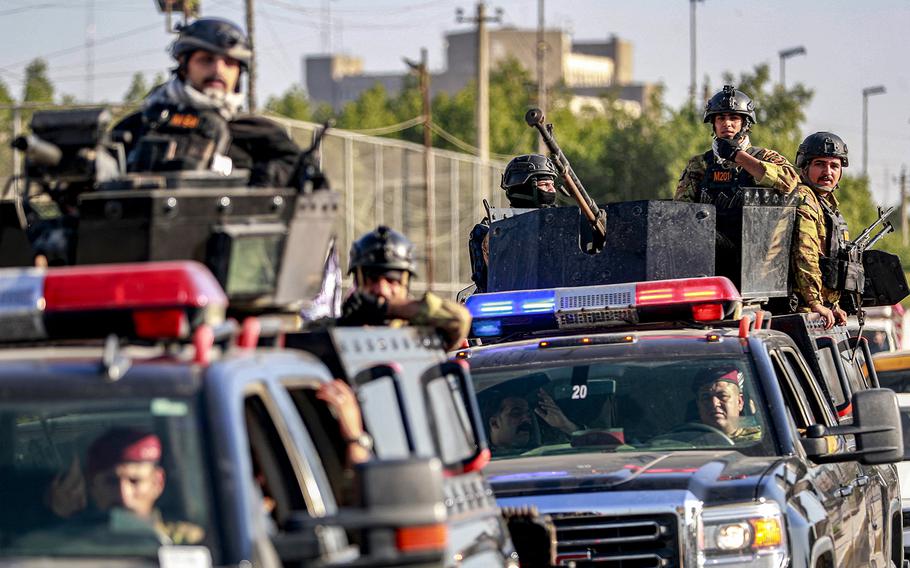
Fighters from Iraq’s Hashed al-Shaabi paramilitaries on Dec. 26. (Ahmad Al-Rubaye, AFP/Getty Images via TNS)
(Tribune News Service) — U.S. strikes on targets in Iraq and fresh attacks by Houthi militants on shipping in the Red Sea provided the latest warning signs that the war in Gaza risks expanding into a wider conflict destabilizing the Middle East.
The Pentagon said late Monday that its forces launched strikes on three installations in Iraq linked to Kataib Hezbollah. Washington said the Iraqi insurgent group that’s backed by Iran was behind an attack that injured three U.S. personnel, leaving one in critical condition.
“While we do not seek to escalate conflict in the region, we are committed and fully prepared to take further necessary measures to protect our people and our facilities,” Defense Secretary Lloyd Austin said in a statement. He called it a “necessary and proportionate” response.
Then on Tuesday, Yemen-based Houthi rebels, also backed by Iran, renewed their attacks on shipping in the Red Sea. MSC Mediterranean Shipping Co. confirmed that the container ship MSC United VIII was hit while en route to Pakistan. It said no injuries were reported.
And US Central Command said in a social media posting on X that a U.S. destroyer and F/A-18 fighter jets shot down 12 attack drones, three anti-ship ballistic missiles and two land attack cruise missiles fired by the Houthis over the southern Red Sea on Tuesday. It said there was no damage to ships or reported injuries.
The U.S. and a number of other nations have formed a maritime task force to respond to the Red Sea attacks. With that assurance, A.P. Moller-Maersk A/S, the world’s second-largest container line, said over the weekend that it was preparing to resume shipping through the sea. Still, oil rose Tuesday as tensions remained high over the shipping disruptions.
Although Iran has denied helping militants attack commercial ships, the Islamic Republic has vowed that Israel will pay a price for an airstrike in Syria on Monday that killed a senior commander of its Revolutionary Guard.
“Clearly, the longer the Israeli-Hamas war goes on with this sort of kinetic intensity, the more likely there would be some escalation,” said Aaron David Miller, senior fellow at the Carnegie Endowment for International Peace and a former U.S. official who has advised secretaries of state on the Middle East.
The number of non-state groups, as well as the unpredictability of both Israeli military operations and Iran’s potential responses, makes it difficult to forecast when specific incidents might flare up into a broader escalation. But Miller said the U.S. would probably be forced to act more assertively if a regional group manages to kill U.S. service members. “If we’re attacked directly and Americans die, then there’s going to have to be a much, much heavier response,” he said.
The attacks, and other developments around the region, highlight an increasingly difficult balancing act for the Biden administration, which is trying to support Israel in its battle against the militant group Hamas, which killed 1,200 Israelis on Oct. 7 and took more than 200 hostages. Hamas has been designated a terrorist organization by the U.S. and the European Union.
The U.S. has deployed aircraft carrier strike groups in an effort to deter Iran-backed forces in the region from striking Israel as it pursues an increasingly deadly ground war in densely populated urban areas in Gaza. But U.S. officials also have put pressure on Israel to wind down its high-intensity operations in Gaza, which have have killed about 20,000, according to the Hamas-run health ministry.
Washington visit
Israel’s Minister for Strategic Affairs Ron Dermer was set to meet Tuesday in Washington with Secretary of State Antony Blinken and National Security Advisor Jake Sullivan for consultations on the conflict in Gaza and the return of hostages held by Hamas.
But for Israeli officials worried about Hezbollah militants in neighboring Lebanon and other groups in the region, the current conflict already looks like the wider war the U.S. says it is trying to prevent.
Israeli Defense Minister Yoav Gallant said in the Knesset that Israel was in the midst of a “multi-front war,” having already been attacked from seven different arenas — Gaza, Lebanon, Syria, the West Bank, Iraq, Yemen and Iran.
“We have already taken action against six of these seven, and I will say now in the clearest manner possible that anyone who takes action against us will become a potential target,” he told the foreign affairs and defense committee. “There will be no immunity for anyone.”
Gwen Ackerman and Justin Sink contributed to this report.
©2023 Bloomberg News.
Distributed by Tribune Content Agency, LLC.